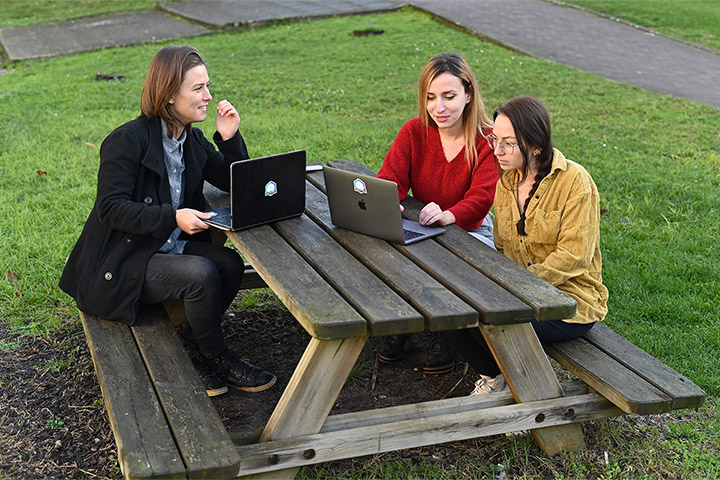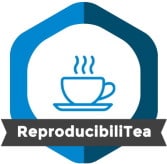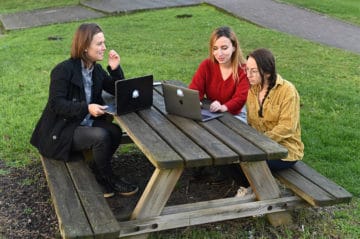
ReproducibiliTea in Bordeaux: A successful year and more to come!
 ReproducibiliTea is a worldwide Open Science initiative spread to 138 institutions in 26 countries. Last year, it was brought to Bordeaux, where the scientific community warmly welcomed it. Let’s meet the PhD students in charge of it.
ReproducibiliTea is a worldwide Open Science initiative spread to 138 institutions in 26 countries. Last year, it was brought to Bordeaux, where the scientific community warmly welcomed it. Let’s meet the PhD students in charge of it.
What is BordeauxTea?
BordeauxTea consists of a cycle of monthly meetings in which students and young researchers discuss various topics related to Open Science around a warm cup of tea and (why not?) delicious cookies (when the pandemonium allowed).
Who are the persons organizing BordeauxTea?
 We are 3 Ph.D. students passionate about open science and reproducibiliy!
We are 3 Ph.D. students passionate about open science and reproducibiliy!
Eduarda Centeno is an M.Sc. in Neuroscience pursuing a Ph.D. in Computational Neuroscience, in Arthur Leblois’ team (IMN).
Fjola Hyseni is a Medical Doctor (MD) pursuing a Ph.D. in Computational Neuroscience, in team Mnemosyne (IMN), under the supervision of Nicolas Rougier and Arthur Leblois.
Dana Conlisk is a Ph.D. student in the team of Veronique Deroche-Gamonet (Psychobiology of Drug Addiction- Neurocentre Magendie).
What did you do in 2021?
In 2021, we had eight sessions covering very different topics & papers, from wet to dry lab. We also had attendees and presenters from various countries, including a special joint session with the Amsterdam (VU) and the Virginia Commonwealth University (VCU) ReproducibiliTeas as an ‘exchange experience.’ These sessions were enriching, and we are happy to say that we had an average of 15 attendees per session this year. Everyone who presented at a session was given a certificate. It was indeed a great first year!
It’s essential to highlight that our first year’s success would not have been possible without our collaborators. First, we would like to mention the fantastic support we received from the Bordeaux Neurocampus Graduate Program. From the beginning, they opened every door, helped with advertisement through their website and newsletters, and guaranteed convivial moments for our in-person sessions. Secondly, we would like to thank the Clinical Neuroanatomy Seminars team for offering the YouTube space to post our videos.
If you missed any of the sessions this year (a summary can be found on OSF), we have a YouTube playlist with the recordings. Check it out!
What is your perspective for 2022?
For 2022 we already have great things planned! As we have advertised through our mailing list (you can subscribe here), the open science journal club is now part of the graduate program catalog as a 10h training course (the course can be found as “GP – ReproducibiliTea – Speaker – Open Science Seminar” on the ADUM platform). This means that Ph.D. students can now register and formally participate in our sessions to get training hours/credits (in addition to the presenter’s certificate). Also, we are very excited to say that part of the assignments of this course will be within a collaboration with the FORRT initiative (Framework for Open and Reproducible Research Training). FORRT brings together educators and scholars working to improve teaching and mentoring practices in higher education.
Some basic rules for the course validation are that each student must host or mediate one of the ten sessions, create or revise a (very) short summary for the FORRT summaries project, and participate in 90% of the sessions (either on Zoom or in-person).
The course is open to everyone, just like open science! Just keep in mind that only 18 Ph.D. students can register in ADUM. The first introductory session will happen on the 25th of January at 5:30 pm (Salle SUD – CGFB and via zoom), but the registration is open until the 18th of February – guarantee your spot soon! Moreover, the sessions will remain open for those who want to participate but cannot register for the course. Master students will receive a certificate attesting to their involvement in the journal club, they can register here .
More information about the ADUM course can be found in an article recently published. In case of any questions, don’t hesitate to ask us.
Anything else to say?
We would like to thank everyone who participated in our 2021 sessions – presenters and attendees. We are happy to see that we were so well received in the local community – we could not have done this without you! Likewise, we hope to see you in the following sessions!
Social networks and contacts
Slack channel (Neurocampus students)
Last update 20/01/22
